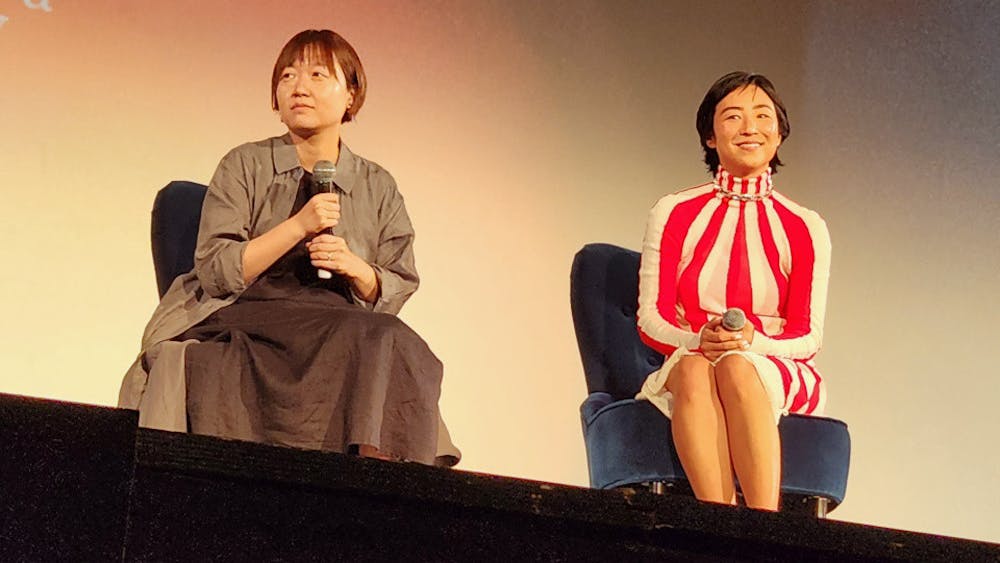What makes us fall in love? In Past Lives, the quietly stunning debut from Korean-Canadian filmmaker Celine Song, the response is a deceptive one. There is in-yun, a Korean concept of fate intimating that thousands of years of past life interactions bring two people together. But there are also the childhood memories shared, the books coincidentally read and the glances that linger too long. Are these so different? Or are they precisely the same?
The couple Song has picked to ponder these questions is Na-young (Greta Lee) and Hae-sung (Teo Yoo). As childhood friends in Seoul, their blossoming romance is uprooted by Na-young’s immigration to Canada. Twelve years later, they reconnect, Na-young now Nora, an ambitious writer living in New York, and Hae-sung an engineering student living at home. They begin transcontinental Skypes, sharing as much of their lives as they can squeeze into a 13” screen.
She is mind over matter, cautious with her emotional intuitions and fearless with her unromantic pursuits. He is sometimes too self-effacing, often awkward and always an open book. Where she is pragmatic, he is starry-eyed. Where he is unsure, she is confident. It’s not simply the attraction of opposites, to be sure. It’s a gentle rendering of how childhood love manifests in adult hearts and of the indomitable, if not spiritual, pull it engenders.
Past Lives roves about with a particular rhythm. Its lyrical pans and lilting score are more interested in the beauty of each brushstroke than the grandeur of the larger painting. Its abstract images — the light changing behind a sheer curtain, a walk home that can’t help but turn into a run — are resonantly universal. Illustrating Nora and Hae-sung’s unconventional relationship in such a way leaves much to our interpretation and imagination, including where the line is drawn between the platonic and the romantic.
It’s a line the film heartbreakingly hovers around. When Nora and Hae-sung meet in New York sometime later, the line becomes a wall — albeit a glass one. What adds a veritable ensemble of dimensions is Nora’s husband Arthur (John Magaro), a conscientious portrait of modern masculinity. Is she attracted to Hae-sung, he wonders. Her reply isn’t the most assuring. Later, he questions (though in many more words) how deep their love is. The answer they reach is beautifully entwined in notions of cultural identity, immigration and intermarriage.
For as much as Past Lives is defined by what it is, it is correspondingly defined by what it isn’t. Departing from Steadicam exactitude, the camera wanders and searches, content to land on frames as they are found. It forgoes airbrushed sets for shooting on location, capturing the cities of New York and Seoul in all their dirt and glory. It doesn’t cut out the handwritten reminder of “keys, phone, wallet” on Nora’s apartment wall any more than it sharpens the webcam resolution of the Skype calls. The characters’ lives, like many of ours, are sketches still in progress.
So, when a select handful of beats don’t quite work, it’s almost an exercise in how we treat imperfections in creative work. Almost. Some are less ambiguous, like Song’s sudden, uneven insertions of Hae-sung when the plot comes calling, producing a disruptive awareness of its fabricated quality. Others can be granted more leeway, such as one parting exchange that builds towards an underwhelming — realistic at best, lazy at worst — reply of “I don’t know.”
All that aside, one of the most remarkable feats Past Lives manages is allowing — not pushing for — its thematic concerns to touch the cosmic. Its real-time, fastidious observation of monotony seems to first discover the very fabric of our lives, then permit us to feel its texture. With this, the ordinary becomes complex, the small becomes grand. A frozen laptop screen is as much of a tragedy as a husband who doubts his wife’s love, which is as much of a tragedy as the end of the world.
True to form, many of these sentiments exquisitely come through in the dialogue. Nora explains how the smallest brush between strangers can be the product of lifetimes of in-yun, the epitome of the macrocosmic microcosms Past Lives makes its subject. The musings of touristic walks and late-night pillow talk make it abundantly clear that the present is inextricably tied to the past and the future, just as the conscious is to the unconscious. “You dream in a language I can’t understand” — that piece of dialogue alone speaks volumes.
So what about love? Song isn’t letting on. If anything, she has delighted in opening the floodgates to a whirlpool of mystical and secular possibility. The closest she ever veers to showing her hand is with a complementary verdict: We don’t ever quite fall out of love. Instead, it morphs and eludes, perhaps across infinite swaths of time, to become whispered thoughts, unsaid words and the extra adjustment of a collar.





